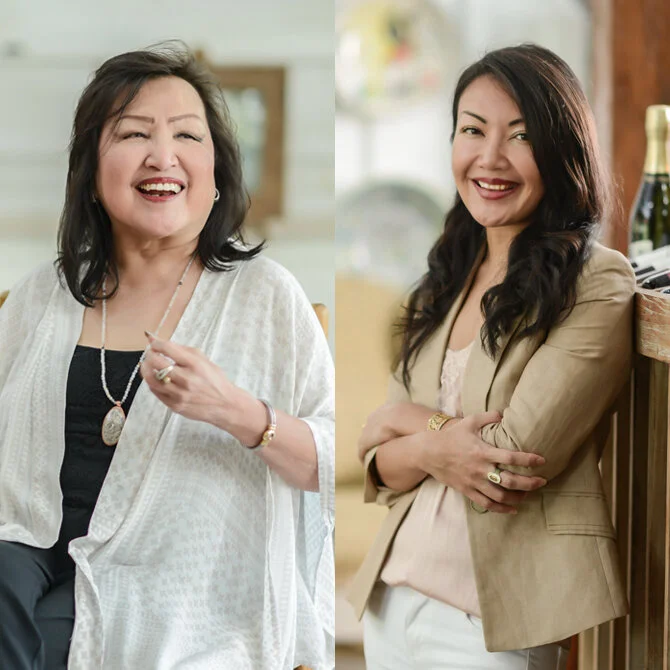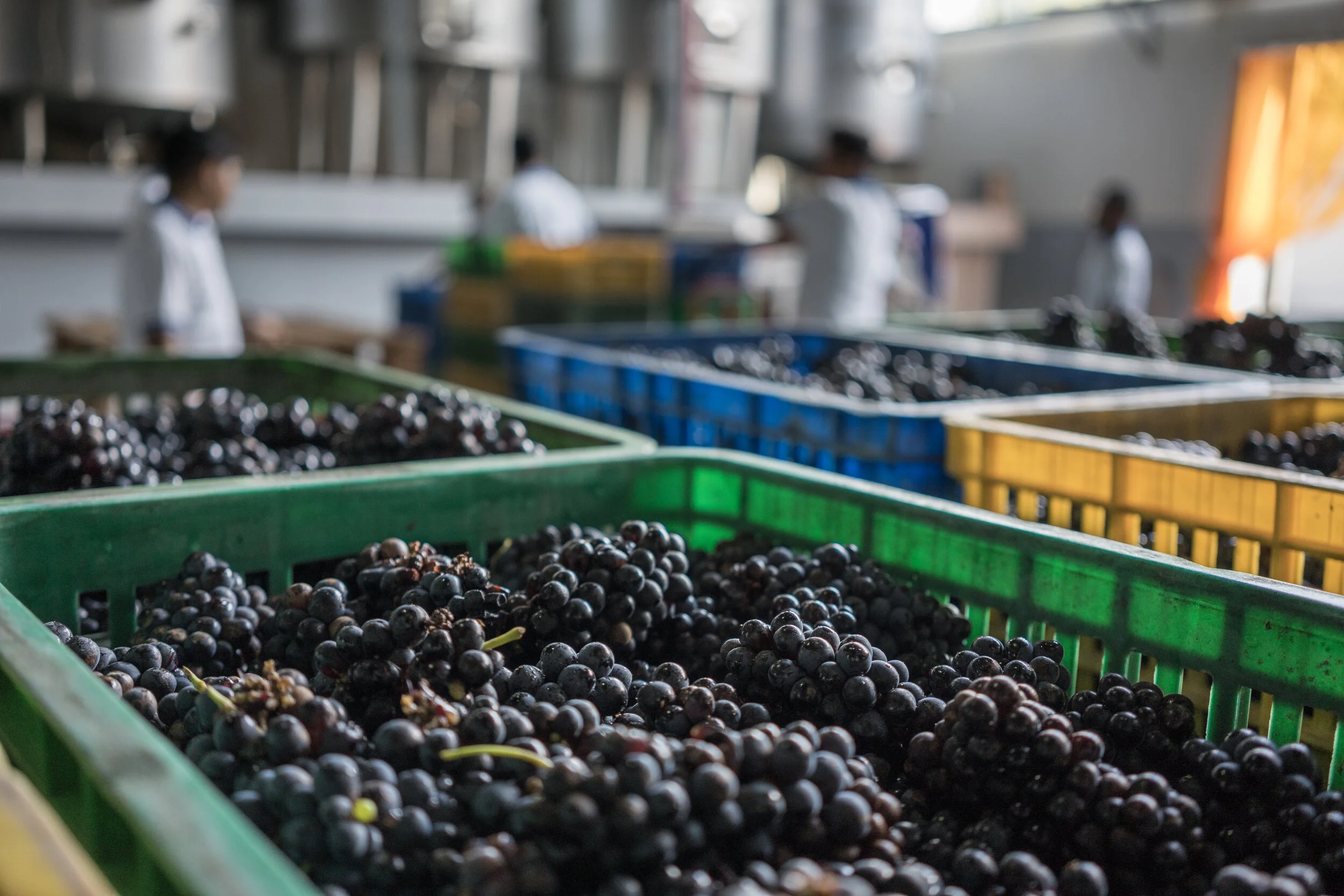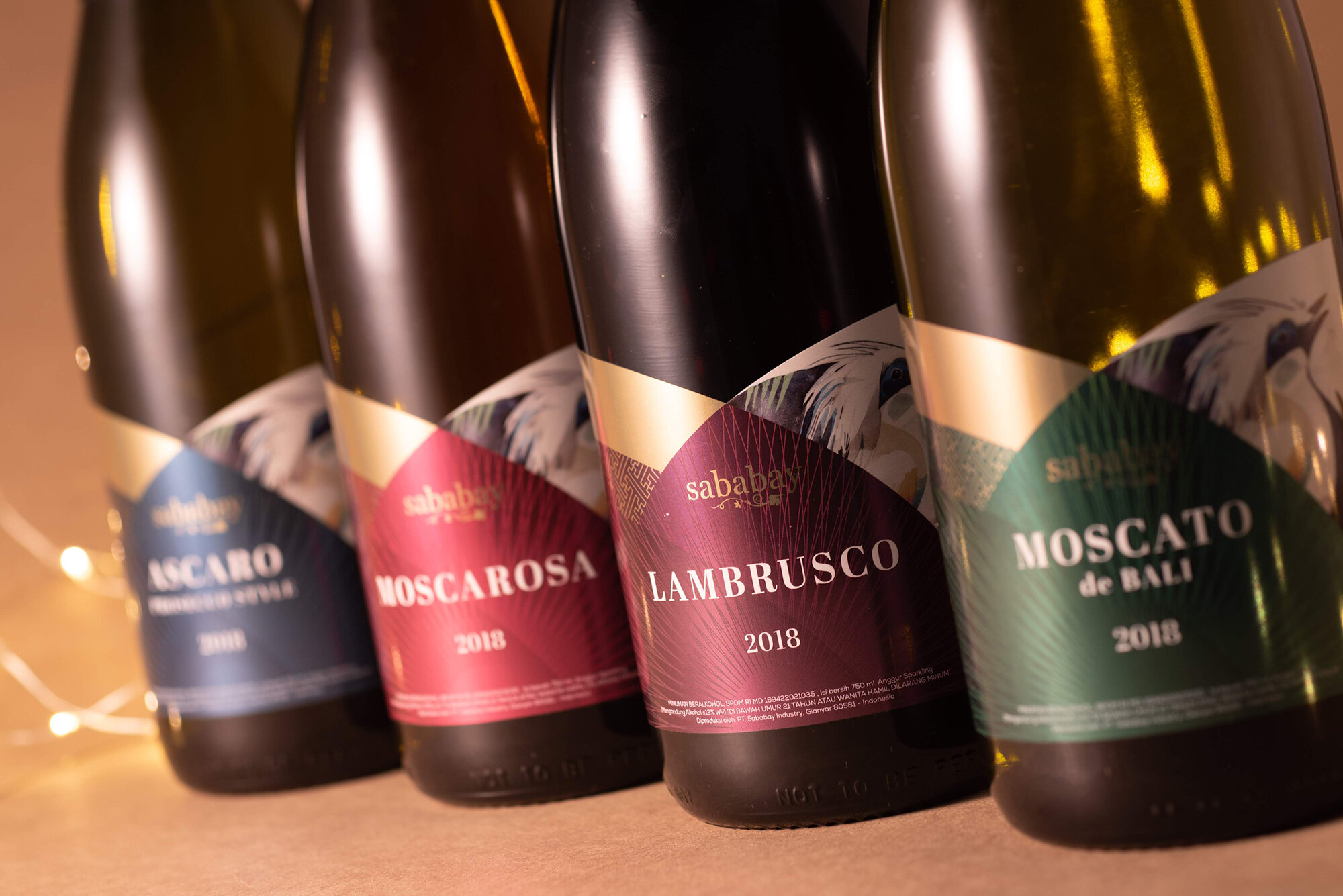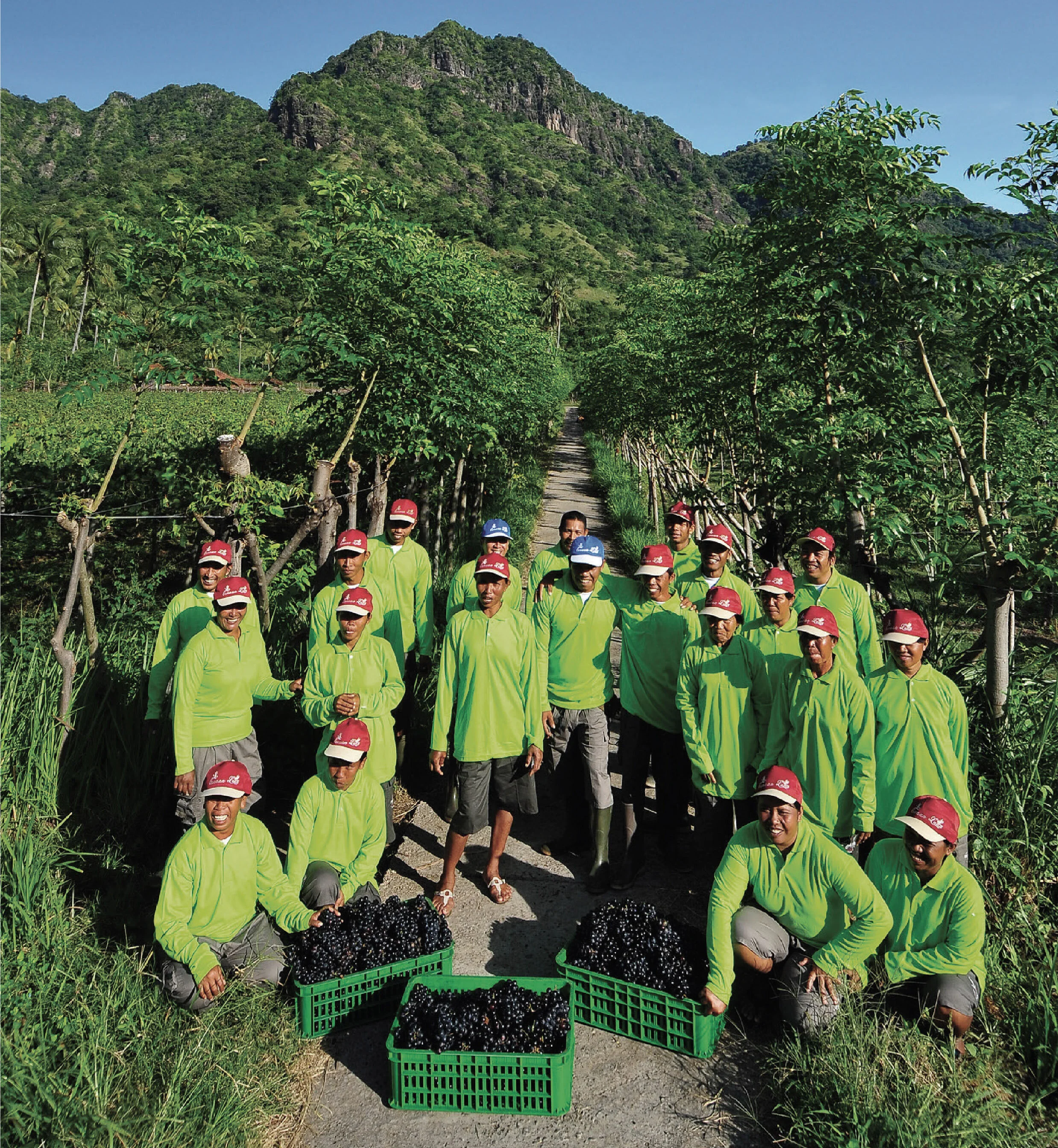TFN Talks with Mulyati and Evy Gozali
TFN Talks sat down with the President of Sababay Winery Mulyati Gozali and Sababay CEO Evy Gozali, Indonesian mother and daughter business moguls who have helped revolutionize the wine culture of Bali. What started out as a dream to create fair trade wine made by local grape farmers in a bid to bring value to the Balinese people and the land, quickly grew into a nationally celebrated and internationally recognized brand. Since its inception in 2010 Sababay has won over 30 international awards including a 2014 Silver Medal from the International Wine and Spirit Competition in Singapore.
Mrs. Gozali, can you tell us a bit about your background. Where did you grow up and what has sparked your passion for business in the agricultural sector?
MULYATI: I grew up in Jakarta and my 50 years working life has always been around numbers: in accounting, data analysis and finance. I started my career at a young age and learned a lot along the way at our family business, a multinational or known as - one of the biggest corporation in Indonesia. When I retired in the late 2008, my passion in agriculture that started when I traveled with family around Bali was growing strong. We came face to face with the poor living standard of the grape farmers in North Bali - most of the farmers were underprivileged, their farms were not managed optimally and many sold their lands just to survive. I quickly learned that the rate of rapid tourism development in Bali does not necessarily encourage the growth of the agricultural sector and give positive impact to the local Balinese, especially the grape farmers. Because of my background as an accountant and analyst, I started to do intense research to get the data points from many sources. From there I set my sole mission to be the bridge between the farmers and the market and create an added value industry: Wine.
Where does your passion for supporting and empowering local Balinese farmers come from? Why is it so important to you?
MULYATI: Because I love Indonesia.
Indonesia is so rich, with 17,000 islands, nature, culture, heritage and resources. We have a population of 270.6 million, the third largest in the world. We have been the target market for various products from all over the world, from luxury goods to the most basic needs, from wine/spirits to meat, fruit, dairy and more. We don’t focus too much on the potential of our soil and local produce – agricultural sectors are competing with imported products that gradually of course are impacting the life of our farmers, industries and local business. 70% of the population of Indonesia are farmers. All we need is a better focus on the local produces, government regulation, less import products that compete with the local produce, plus support on research and development. I felt that this is important. Without industry support and collaboration to create added value products, this potential farming and agricultural sector would be under threat. Learning from that I think it is important to empower farmers to take ownership of their land and share responsibility. The agriculture potential is big, we just need to work hard and trust God to lead.
EVY: I remember the first time me and mum met the farmers in North Bali. They were sad, they could only sell their grapes for Rp 500,-/ kilo or $0.035 – some of the grapes were even just left abandoned. The farmers who own the land owed money to the middle man with strategy of lending money and secure super low harvest price.
It was not easy for me to believe, especially because I don’t come from an agricultural background and this is hard to understand. I know my mum would not stop there so I supported her along the way. Learning one step at the time to build the farmers confidence and trust. We empowered the farmers, set a collaboration with the Asteroid R & D expert team in which together they formed a corporate farming concept - a partnership to exclusively trade for a fair price and education. The result is sustainable good harvest, consistency and commitment. And on top of that, the most important thing is that we want them to be proud of being farmers – why not!?
Where did the idea for Sababay Winery come from and what is the philosophy behind the brand?
MULYATI: My late husband loved agriculture, with his natural talents and knowledge in the field, he encouraged me to explore this industry at the beginning. We went to see many wineries in Europe, learned about the business and the ecosystem. I was so inspired. Sababay Winery was born in 2011 with state-of the art facilities, superior production technology in collaboration with the grape growers from the North of Bali - we also brought a French maker to enhance a premium, locally produced brand. Together with the winemaker team we bring the passion to develop the soil and fruit, with advances in temperature control systems combined with irrigation techniques, and better rootstock selections – it has opened up parts of the world previously thought unsuitable to wine production. Sababay is an added value from grapes to wine, proudly made in Indonesia. .
EVY: The name “Sababay” itself, originated from the winery’s location along the beautiful ‘Saba’ Bay in Gianyar, Bali. The philosophy behind Sababay brand has always been about our passion that leads to innovation in products, processes and the business model. We open our doors for an educational experience on the winery tour and during wine tasting. This exciting activity is new for Bali. We have been welcoming people from all over the world, for the winedown picnic setting in the garden, wine lunch, group gathering, and many communities. This is part of our dream too. People buy our wines to bring home as a ‘conscious customer choosing Sababay wines and impacting lives’, and be inspired .
People can book online or come to our ‘House of Sababay’ bottle shop and find out about our winery tour which is open every day.
Evy, what is it like to build and expand a wine brand alongside your mother?
EVY: My mum is an inspiring lady not only for me and my two sisters but to many people. She encourages us all to do our upmost in the business, looking at the market size, expand and represent the brand as a local product with confidence. She always thinks for long term and sees and believes in Indonesia’s potential. She has since the very beginning. On top of that her faith and principles are strong - that everything can be solved with the right mindset and trust, God and timing.
How does it feel to run a successful women owned Winery in Indonesia? What has the feedback been like in the industry?
EVY: Sababay are closely collaborating with local grape farmers, winemakers, wine experts and distributors to create local products with international standards while respecting the principles of transparency, equality, diversity and individual rights in our company and community.
Our approach to our customer is recognized as unique and fresh. We embrace the new consumers, younger or beginner who love light, easy to drink wines. They are the new generation who are creative, love local products, and understand the nature force like the terroir. They are encouraging food pairing in respect to local ingredients and old recipes. Celebrity chefs have been involved in the process of bringing the New Latitude wine to rise as a trending topic.
As women in winery business, our jobs are to continuously create visibility, strategy and focus on getting our product known through comprehensive promotion and prominent premises, intensifying partner relations, and consumer relationships, as well as activities and utilizing media as information dissemination agents.
Feedback from the industry has been great, customers who drink Sababay endorse with respect that every bottle they drink is affecting the welfare of grape farmers in Bali. We also leverage social media / digital platforms by engaging stakeholders for dialogue, share knowledge and influence target audience.
What are some of the challenges you have had to face with running Sababay Wines and how do you overcome them?
MULYATI: As Indonesia does not have a wine culture, and most Indonesians are used to imported brands, selling wines to local people is challenging .We spent a lot of time in educating the local market and lucky enough that Indonesians are proud of their local food, so we introduce wines in their daily life through local gastronomy pairing .. like we pair our white wine with fried cassava cheese and Dabu Dabu Manado sauce ...
Unexpected pairings that are unforgettable!
EVY: We also open our winery for tours, as visiting the birthplace of every bottle of Sababay is a transcendental and joyful experience!
My introduction to Sababay Wines was when I bought a bottle of the Pink Blossom to take to a Christmas Party. I quite enjoyed the Rose's light raspberry, apple and floral aroma and it had me coming back for more. What are each of your favorite Sababay wines and why?
MULYATI: Difficult to choose – I like them all, as our wines are easy to drink on all occasions. If I have to choose my favorite then I go for ASCARO – Dry Bubbly White – from Pinot Grigio and Muscat grapes. It is delightful bubble and refreshing. It is always fun to have a chilled sparkling in your hand to celebrate life and being grateful.
EVY: MISTELLE, Vin de Liqueur Style – 19% alc, from Muscat grapes that is locally grown. Just amazing, I love it so much – like dessert in a glass. I enjoy it as my “me time” or with friends on casual nite. The aroma is honey, white flower and ginger, perfect – we launched it during pandemic June 2020, dedicated to Women and their ability to multi-task, juggling their time every day between career and home. It is delicately sweet and aromatic. luring you with honey and tropical fruit tastes; pineapple and mango – further enhanced by vanilla undertones.
Grape Farmers of Bali
Can you walk us through the step by step process of creating a wine?
EVY: Steps for Winemaking (red) - first we pick the grapes
Alphonse Lavallee & Shiraz and then DE-STEMMING & CRUSHING; To separate the berry from the stem, then berries are crushed. Next, FERMENTATION & PUMPING-OVER; yeast is added to start the fermentation process (this lasts 10 days). The process creates alcohol, carbon dioxide and extra aromas. After that PRESSING; When fermentation is finished, the grape skins are processed in the press machine to extract the press wine from them. The next process is AGEING; Infusing the wine with oak chips to develop aromas, structure and stability (3 - 4 months). From there CLARIFICATION & STABILIZATION, SAMPLING; During all the process, the wine is tasted and analyzed. Finally: BOTTLING & LABELING; Going through 2 stations (rinse-fill-cap, & label) then wine is ready to be enjoyed!
What makes Sababay Wines so special in the Indonesian wine market?
MULYATI: In the wine business only 5% of wines are really from the local winery – but the times are slowly changing. Quality Indonesian products are getting better and are capturing the hearts of the local population, so we, just as many quality locally produced brands, have opportunity to grow within Indonesia. We created wines that appeal to Indonesian palates, sweet and easy, which pair well with Indonesia’s many dishes. Our market share is growing fast, that has shown market confidence to Sababay. We have just launched our Sababay Distillery premium spirits, Grappa, Vodka and Vodka infusion of nutmeg (our dedication to Indonesia, the island of spices. We are continuously bringing the products available to the market.
EVY: I think it is also our ability to innovate and respond to the market demand. We have a team doing surveys and gathering knowledge. We make sure we communicate our brand in a way that appeals to the different age groups in the market. Our social media campaigns are fun, young and happy – wine for all occasions. We care about the social impact too, so we carefully make sure legal drinking age is applied and the message of drinking responsibly is clear.
We also collaborate with partners with the same vision and passion for Indonesia and the Indonesian market.
What are your future plans with Sababay Wines?
MULYATI: Our mission is to elaborate on local products with international standards that are accessible to all, to enjoy and to give back to the land and to the local community. To uphold social responsibility in the local communities by creating jobs with constant training for the work force. Sababay empowers and encourages farmers to be proud and take ownership of their land while also maintaining harmonious relationships with trading partners and consumers. Grapes are the beginning – in the future we will look at other potential – expand it to its fullest and be the pride of Indonesia.
EVY: Maintaining and introducing new markets and segmentations (this includes 10 new tourism destinations in Indonesia). This is part of our strategy. It is not easy to participate in the wine business that is already established and dominated by imported wines. Most wine lovers are familiar with Old World Wines and New World Wines. Old World Wines come from the traditional wine growing areas of Europe and North Africa. New World Wines come from areas such as the United States, South America, South Africa, Australia and New Zealand. 95% of wine distributed in Bali are imported wines, so hotels, restaurants and bottles shops are mainly pushing the imported wines they have on their list.
Look out guys ... New Latitude wines are slowly blooming ..
Do you plan to export Sababay Wines to international markets?
MULYATI: With a government plan to boost the number of tourists in the dedicated 5 top priority destinations in Indonesia, there will be confirmed need for wine demand to increase. Sababay is confident in our ability to produce local wine in Bali with international quality. I guess our focus will be to fulfill the domestic needs and demands before export - Sababay winery can meet the expectation quota from within the country and certainly will simulate the agricultural sector, especially the wine farms, in a sustainable way.
EVY: Change is the only constant thing in this world. If we are not growing, we are dying. I ask everyone reading this interview and our story, when they are in Indonesia, please try our wines with curiosity and an open mind. And please drop me a message to my personal email evy@sababaywinery.com to share your experience!
It would be amazing if I can welcome you to the Sababay winery tour as well! You can find out more about our tours on our website.
‘TFN Talks’ In Partnership with Tropical Nomad Coworking Space







